Cudd v Li, San Mateo County Superior Court Case Number 18-CIV-01355.
Donald Magilligan is listed in the online court records as one of the attorneys for the plaintiff. For the ruling referenced below, it is our understanding the attorney who signed the pleadings who is being criticized by the judge is Don Magilligan.
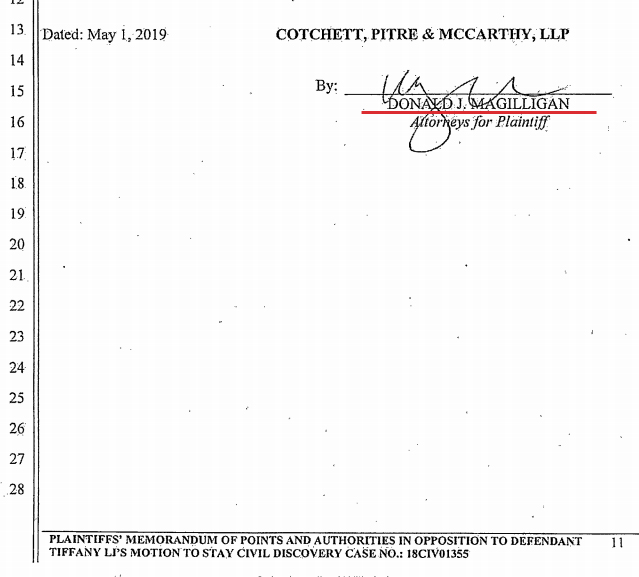
From the judge's ruling it is Lawzilla's understanding the following happened:
The plaintiff, represented by attorney Magilligan's firm, sued the defendant Li, and also served discovery for the defendant to answer.
There is a criminal action pending against the defendant. Asserting the 5th Amendment right against self-incrimination, defendant made a motion to stay discovery in this civil lawsuit until the criminal action had concluded.
The judge granted defendant's motion.
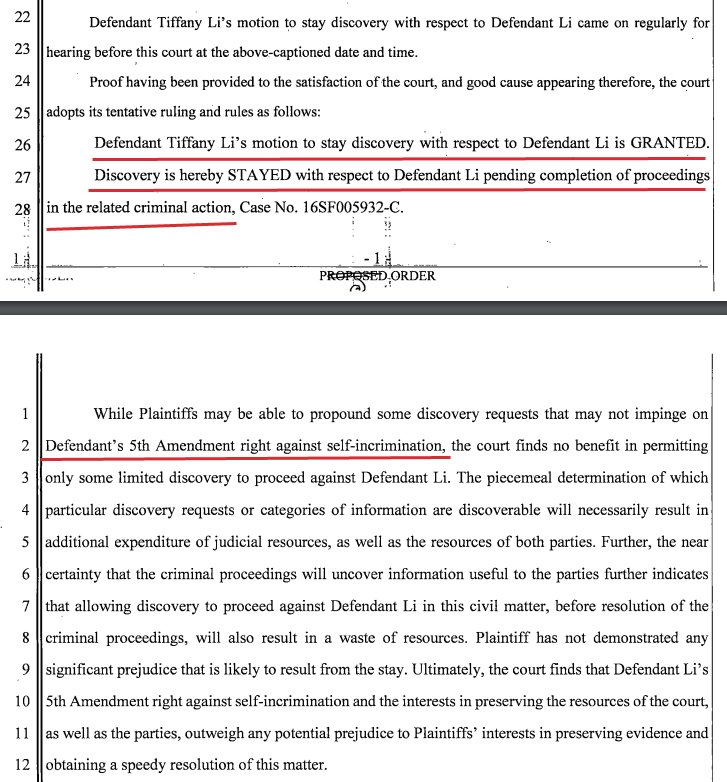
In doing so, the court made comments about the argument made by Donald Magilligan, Esq.
Initially, the trial judge said both parties (their attorneys) referenced a case called Pacers when arguing the merits of their respective positions.
However, as to the argument made by attorney Duffy Magilligan, the judge said he "mispresent" the facts of the case to the court and did not make any pinpoint cites supporting his claimed version of the facts.
The judge said what happened in Pacers was actually "contrary" to the "characterization" Magilligan had made.
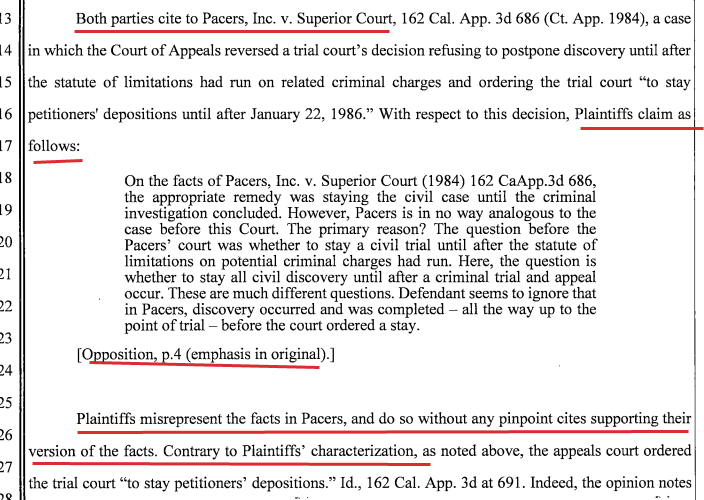
The judge went on to conclude that assertions made by attorney Magilligan in his argument to the court were "baseless" and "misleading".
The judge indicated the other attorney properly characterized the case to the court.
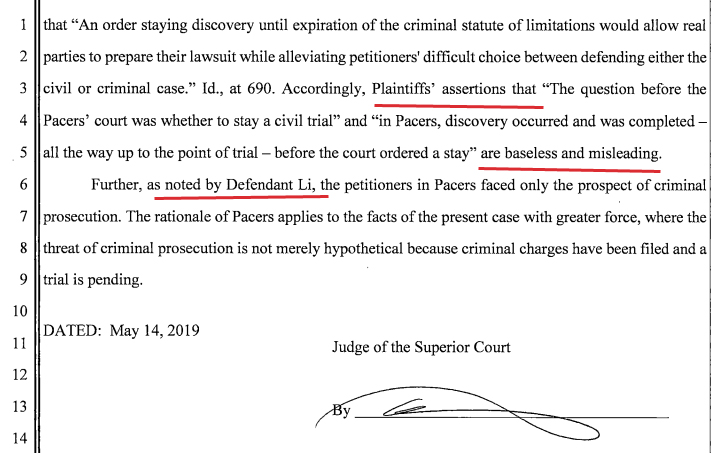
Lawzilla Commentary and Review:
We are concerned whenever a judge says an attorney makes a misrepresentation to the court.
- We expect attorneys to know the law, and to be able to read cases, so they can accurately characterize and represent the case to the judge. In our view this goes to basic attorney competence.
- If a judge calls out an attorney for making a misrepresentation, to us that goes to credibility. Will a judge be willing to believe an attorney in the future when the attorney has previously made misrepresentations? In our opinion a lack of credibility due to making a misrepresentation in a case could impact rulings in future cases. We would want our attorney to have a gold standard of credibility where the judge knows what the attorney represents about a case is true.
This is only one ruling in one motion in one case. But it would give us pause before hiring this attorney, especially if issues in the case could be decided by this judge.
Update:
Lawzilla reported on a motion defendant filed to stay discovery due to the 5th Amendment. Attorney Duffy Magilligan of the Cotchett, Pitre and McCarthy law firm signed the opposition papers on behalf of their client the plaintiff.
The judge's order commented on the argument being made, which Lawzilla reported on.
Cotchett, Pitre and McCarthy had also filed a different motion for sanctions. That motion was either withdrawn and/or denied, but after Lawzilla's reporting it triggered a counter motion for sanctions by defendant for needing to spend time opposing the sanctions motion.
The judge denied defendant's motion. In doing so, there was apparently reference to the prior order Lawzilla reported on.
The judge said:
"Defendant also notes that the court's order on the motion to stay discovery found Plaintiffs' discussion of Pacers Inc. v. 28 Superior Court (1984) 162 Cal.App.3d 686 to be misleading. However, the court's order did not find that Plaintiffs' conduct was intentional, and Defendant has provided no basis for concluding that Plaintiffs intended to misrepresent the facts or holding of Pacers."

In Lawzilla's opinion it is an interesting choice of words by the judge.
Our lay opinion is the judge basically reaffirmed the prior order's comments that Magilligan / Cotchett, Pitre and McCarthy made a misrepresentation to the court.
The judge did not say that upon further reflection, or due to the new briefing for this other motion, or for some other reason that the judge's order Lawzilla reported on was incorrect.
But the judge said the order did not state, and defendants cannot show, the misrepresentation was intentional.
Is the judge saying Magilligan and his law firm were just negligent in the research or briefing?
We wonder, how is an opposing attorney supposed to obtain evidence of what is going through opposing counsel's mind when they prepare an argument?
Donald Magilligan was admitted to the California Bar in 2008. Bar Number 257714.
Donald James Magilligan
Cotchett, Pitre and McCarthy
840 Malcolm Road, Suite 200
Burlingame, California 94010
Law School: University of San Francisco
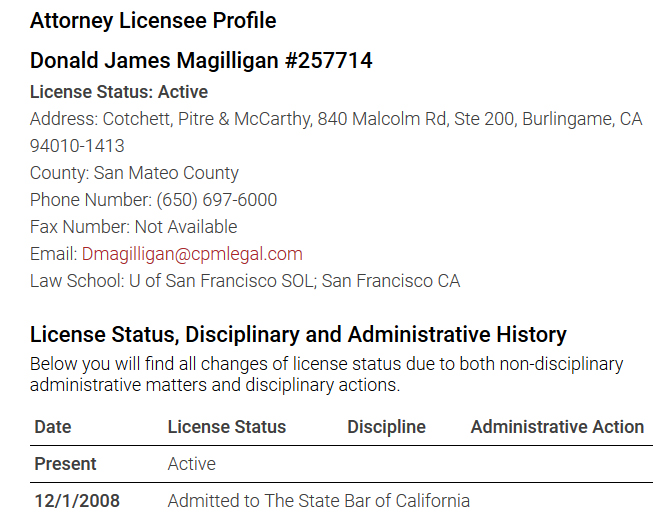
Based on his law firm profile, it is our understanding Donald goes by the nickname "Duffy".